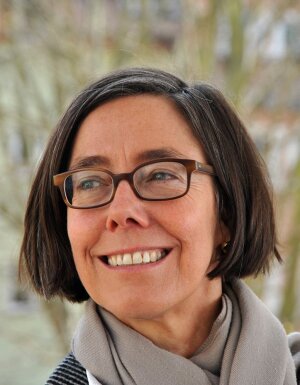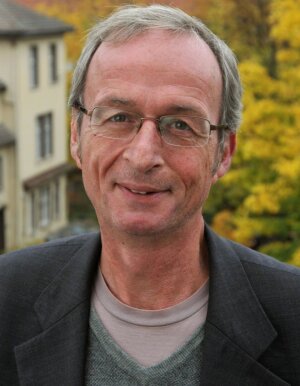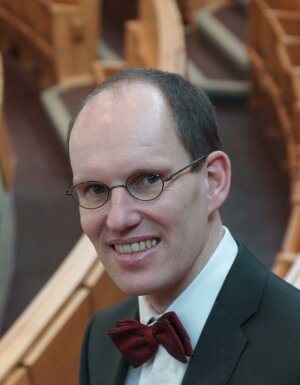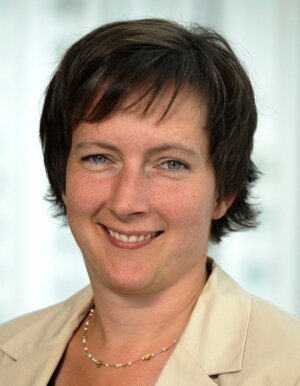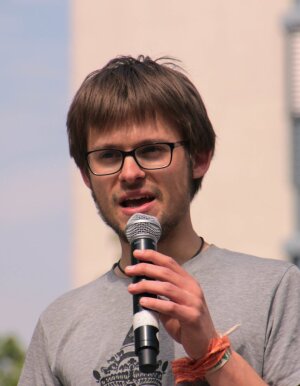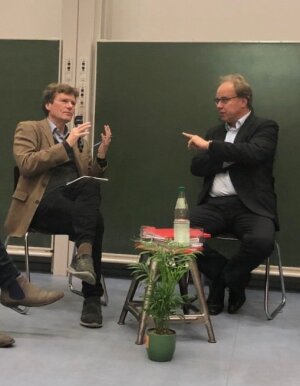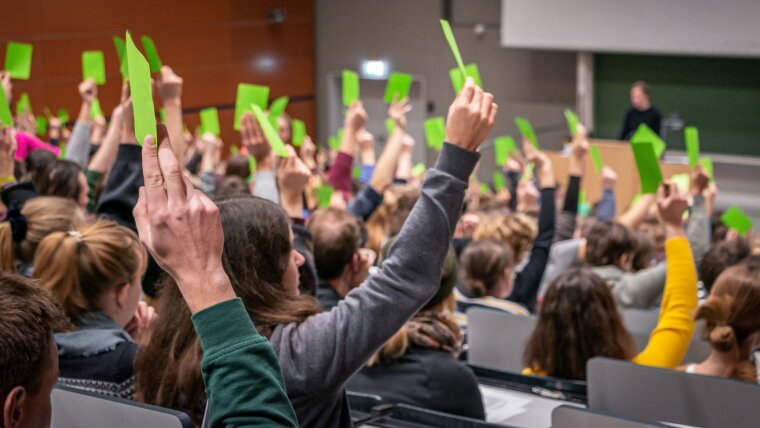
A week of climate education for everyone! This was the idea at the heart of the »Public Climate School« initiative in November 2019, when »Students for Future« organized lectures, workshops, and debates on climate change for the general public throughout Germany. The students wanted to show that climate-friendly action requires commitment and expertise from various disciplines. The climate strike week was widely supported by all faculties at the Friedrich Schiller University Jena. We asked around what the speakers at Jena’s »Public Climate School« had to say.
Prof. Dr. Andrea Marlen Esser
The philosopher held a public lecture titled »...and the devil may care?
What do climate ethics demand?«
Prof. Dr. Andrea Marlen Esser, Universitätsprofessorin für Praktische Philosophie am Institut für Philosophie an der Friedrich-Schiller-Universität Jena
Image: Anne Günther (University of Jena)»If we want to stop harming the climate, we might have to give up some of our habits. But are we morally obliged to curb our consumption? When it comes to the human right of self-preservation, climate ethics demand a contribution from all people, but particularly from states. In accordance with the principle of distributive justice, this contribution depends on each state’s power and responsibility for
global warming.«
Sven Morgen
The political scientist held a seminar on the concept of crisis in the context of climate change and (foreign) policy.
Sven Morgen
Image: Privat»Climate change is a crisis that is challenging the international order and the stability of our national political systems. Countries are in a race against time, and their potential actions are being whittled down to a standstill. However, the crisis might also present an opportunity: Inflexible structures will become less rigid, making room for potential actions which may be considered impossible today but promise a comprehensive solution to the problem in the future.«
Prof. Dr. Friedemann Schmoll
The cultural scientist held a discussion on our food and where it comes from.
Prof. Dr. Friedemann Schmoll
Image: Anne Günther (University of Jena)»The agricultural industry provides
us with food, but nature is dwindling in the face of monocultures
and factory farming, which are
creating purely functional landscapes. It is high time to change
our interaction with the environment. A sustainable change in our diets would protect biological diversity and slow down climate
change.«
Prof. Dr. Gerhard G. Paulus
In his lecture, the physicist presented models that can be used to calculate the earth’s temperature.
Prof. Dr. Gerhard G. Paulus
Image: Jan-Peter Kasper (University of Jena)»For 200 years, there have been
simple yet compelling physical
arguments for the existence of the
greenhouse effect and therefore for the risk of global warming if the concentration of greenhouse gases increases. The crucial correlations behind rising global temperature can even be illustrated with a simple formula*.«
Formula to calculate the earth’s temperature
Image: Gerhard G. Paulus| TEarth is the earth’s temperature, i.e. the sought value, measured in Kelvin (°C plus 273). TSun is the sun’s temperature (5,800 Kelvin). ρ is the albedo, i.e. the proportion of sunlight that hits the earth and is not absorbed, but reflected (= 0.3). β is the proportion of heat that is radiated by the earth’s surface and absorbed by the atmosphere. β is currently 0.78. For these values, we obtain an average temperature of TEarth = 288 Kelvin (15°C). However, β increases in line with the concentration of greenhouse gases: When β is 0.79, the temperature is 0.5 °C higher. |
Prof. Dr. Christine Römermann
The ecologist and her team are investigating the effects of climate change on plant biodiversity.
Prof. Dr. Christine Römermann
Image: Stefan Krutsch»Plants are particularly sensitive to
climate change; they are developing
strategies to adapt to the changing
conditions. This can also be observed in local ecosystems, where many plants are flowering earlier
and earlier, thus increasing the risk
of frost damage and keeping away
important pollinators. These shifts
are leading to changes in plant species composition and, eventually, to changes in biodiversity.«
Robert Pauli
The climate activist from »Fridays for Future« held a workshop to present and refute some of the common arguments used by climate crisis deniers.
Robert Pauli
Image: Privat»›CO2 is an essential trace gas—it can’t be harmful!‹ This is a classic
argument used by climate crisis deniers that completely disregards any further consequences. CO2 may well be benefitial for plants and heat up the atmosphere at the same time. Climate sceptics don’t consider the next step either: Additional CO2 is absolutely useless to plants if the ground they grow on is becoming barren and overheated.«
Prof. Dr. Andreas Freytag (r.) und Prof. Dr. Hartmut Rosa
The economist and sociologist held a debate on how to adequately tackle the global dimensions of the climate crisis.
Prof. Dr. Hartmut Rosa (l.) und Prof. Dr. Andreas Freytag beim Streitgespräch.
Image: Till BayerThe overuse of global resources, such as forests and oceans, will soon push the planet to its limits. We cannot continue like this. While economic expert Andreas Freytag calls for »economic incentives in the form of certificates to promote climate-friendly actions«, sociologist Hartmut Rosa sees things differently: »We have to overcome our obsession with growth—we need a change of mentality!«
Survey: Till Bayer
